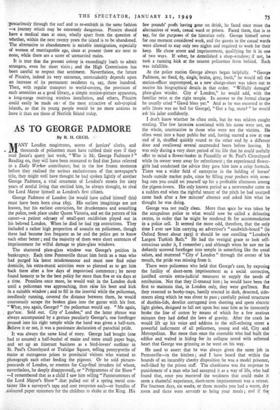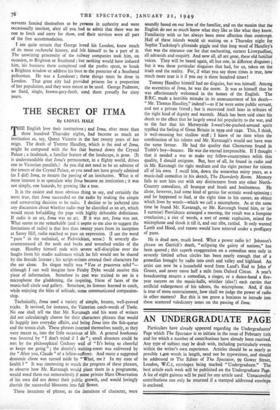AS TO GEORGE PADMORE
By R. H. CECIL • MANY London magistrates, scores of justices' clerks, and thousands of policemen must have rubbed their eyes if they read Janus's query last week, " Who is Mr. George Padmore ? " Reading on, they will have been reassured to find that Janus referred to a Daily Worker contributor; but in the few frozen moments before they realised the serious exclusiveness of that newspaper's title, they might well have thought he had spoken lightly of another George Padmore, a vital ornament of London's streets for sixty years of zestful living that entitled him, he always thought, to rival the Lord Mayor himself as London's first citizen.
George Padmore of London (he would have called himself this) must have been born circa 1855. His earliest imaginings are not known, but his earliest conviction, for drunkenness and assaulting the police, took place under Queen Victoria, and set the pattern of his career—a patient odyssey of small-part recidivism played out in his beloved London. When he died he had 159 convictions. They included a rather high proportion of assaults on policemen, though these had become less frequent as he and the police got to know each other better ; and the majority of them were short sentences of imprisonment for wilful damage to plate-glass windows.
The shattered plate-glass window was George's petition in bankruptcy. Each time Pentonville thrust him forth as a man who had purged his latest misdemeanour and must now find other domicile, his extra-mural activities were so planned as to get him back there after a few days of improvised commerce ; he never found honesty to be the best policy for more than five or six days at a time. Penniless once more, he would wait in the London dusk until a policeman was approaching, then raise his boot and kick in a suitable window ; and to fill in the interval while the policeman, needlessly running, covered the distance between them, he would courteously scrape the broken glass into the gutter with his foot. " What, you again, George? " the policeman would say. " Me again, guv'nor. Sold out. City o' London," and the latter phrase was always accompanied by a gesture peculiarly George's, one forefinger pressed into his right temple while the hand was given a half-turn. Believe it or not, it was a passionate declaration of parochial pride.
It was always the same kind of story. George had bought (one had to assume) a half-bushel of maize and some small paper bags, and set up an itinerant business as a bird-lovers' outfitter in St. Paul's Churchyard or Trafalgar Square, selling pennyworths of maize at outrageous prices to provincial visitors who wanted to photograph each other feeding the pigeons. Or he sold picture- postcards of London, or rosettes for Cup-final invaders (of whom, nevertheless, he deeply disapproved), or " PrOgrammes of the Show " —I remembered that as a child I saw him selling " Parmerammers of the Lord Mayor's Show" .that pulled out of a spring metal con- tainer like a surveyor's tape and cost twopence each—or bundles of (coloured paper streamers for the children to shake at the King. His
few pounds' profit having gone on drink, he faced once more the alternatives of work, casual ward or prison. Faced them, that is to say, for the purposes of the historian only. George himself never for one moment considered work, and the guests in the casual wards were allowed to stay only two nights and required to work for their keep. He chose arrest and imprisonment, qualifying for it in one of two ways. If sober, he demolished a shop-window; if not, he took a running kick at the nearest policeman from behind. Each was infallible.
At the police station George always began helpfully. " George Padmore, no fixed, 65, single,' brahn, grey, fresh," he would tell the station-officer unprompted, as a new charge-sheet was taken out to receive his biographical details in that order. " Wilfully damagin' plate-glass winder. City o' London," he would add, with the familiar twist at the right temple. In answer to the formal charge he usually cried " Gawd bless yer." And as he was escorted to the cells (there was no bail for George), " Got a fag, mate? " he would ask his jailer confidently.
I don't know whether he often stole, but he was seldom caught stealing. The few larcenies associated with his name were not, on the whole, unattractive to those who were not the victims. Ho often went into a busy public bar and, having started a row at one end of it, shuffled quickly round to the other end by a different door and swallowed several unattended beers before leaving. It was only during a very short period of his life that he could usefully offer to mind a flower-basket in Piccadilly or St. Paul's Churchyard while its owner went away for refreshment ; the experienced flower- girls had condensed the advice they gave him into a crisp formula. There was a wider field of enterprise in the holding of horses' heads outside market pubs, since by filling your pockets with nose- bag oats you could set yourself up for a profitable afternoon among the pigeon-lovers. His only known period as a newsvendor came to a sudden end when the rightful tenant of the pitch he had usurped came back after a few minutes' absence and asked him what he thought he was doing.
George was not really clean. More than %nee he was taken by the scrupulous police to what would now be called a delousing centre, in order that he might be rendered fit for accommodation in a police cell. It seemed the more odd, therefore, that the only time I ever saw him carrying an advertiser's " sandwich-board" (in Oxford Street about 1923) it should be one extolling "London's Largest Turkish Bath." He had the vestigial grace to look self- conscious under it, I remember ; and although when he saw me he defiantly screwed forefinger into temple in something like the usual salute, and muttered "City o' London" through the corner of his mouth, the pride was missing from it.
There were policemen who held that George's case, by exposing the futility of short-term imprisonment as a social corrective, justified certain extra-judicial measures to supply the needs of retribution. Not that they ill-treated him ; he would have been the first to maintain that, in London only, they were gen'lmen. But they resorted to booby-traps, hastily erected in dark, deserted, side- streets along which he was about to pass ; carefully poised structures of dustbin-lids, derelict corrugated iron sheeting and spent electric light globes, designed to fall not upon but near him as he innocently broke the line of cotton by means of which for a few anxious minutes they had defied the laws of gravity. After the crash he would lift up his voice and address to the still-echoing street a powerful indictment of all policemen, young and old, City and Metropolitan. But more than once the constable who had built the edifice and waited in hiding for its collapse noted with softened heart that George was grinning as he went on his way.
He used to assert that he was always given the same job in Pentonville—in the kitchen ; and I have heard that within the bounds of an incurably cheeky disposition he was a model prisoner, well-liked by the prison staff. The cheekiness was the response to punishment of a man who had accepted it as a way of life, who had found that, once you mastered the weakness that could make it seem a shameful experience, short-term imprisonment was a retreat. For fourteen days, six weeks, or three months you had a warm, dry room and there were servants to bring your meals ; and if the
servants fancied themselves to be persons in authority and were occasionally insolent, after all you had to admit that there was no one to fetch and carry for them, and their services were all part of the free accommodation.
I am quite certain that George loved his London, knew much of its more recherchi history, and felt himself to be a part of it. The unwitting generosity of the railway companies took him, on occasion, to Brighton or Southend ; but nothing would have induced him, his business there completed and the profits spent, to break a Brighton window or address his boot to the posterior of a Southend policeman. He was a Londoner ; these things must be done in London. That great city had provided prisons for a proportion of her population, and they were meant to be used. George Padmore, no fixed, single, brown-grey-fresh, used them proudly for sixty years.







































 Previous page
Previous page